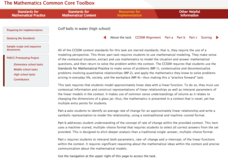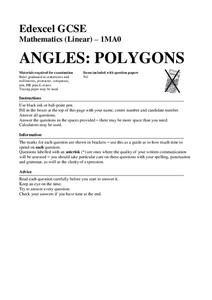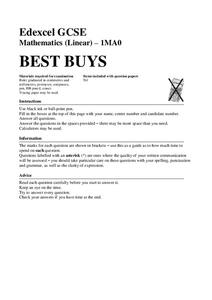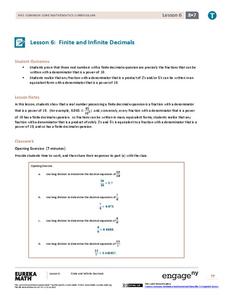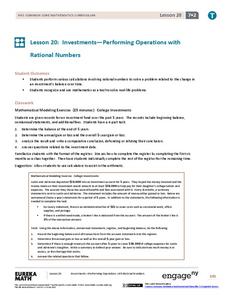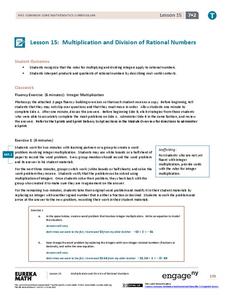EngageNY
Truncated Cones
Learners examine objects and find their volumes using geometric formulas in the 21st installment of this 25-part module. Objects take the shape of truncated cones and pyramids, and individuals apply concepts of similar triangles to find...
Mathematics Common Core Toolbox
Golf Balls in Water
Here's a resource that models rising water levels with a linear function. The task contains three parts about the level of water in a cylinder in relationship to the number of golf balls placed in it. Class members analyze the data and...
Mathematics Assessment Project
Statistics and Probability
Quickly assess basic understandings of statistics and probability. The resource contains five quick tasks from the probability and statistics domain. The questions range from finding simple conditional probabilities to measures of...
Mathematics Assessment Project
Modeling Motion: Rolling Cups
Connect the size of a rolling cup to the size of circle it makes. Pupils view videos of cups of different sizes rolling in a circle. Using the videos and additional data, they attempt to determine a relationship between cup...
Mathed Up!
Nets, Plans, and Elevations
A dimensional resource teaches viewers to recognize 2-D views of 3-D objects and how to match nets with their 3-D figures. Individuals draw different views of three-dimensional objects including views from the front, side...
Mathed Up!
Angles in Polygons
Show your class that finding angle measures is a regular calculation with a resource that provides 12 problems dealing with the measures of angles in regular polygons. Pupils use formulas for the sum of measures of angles in a polygon to...
Mathed Up!
Angles in Triangles and Quadrilaterals
This short video show viewers how to connect the sum of the angles in a triangle to other angle measurements. Pupils determine the missing measures for angles involved with triangles and quadrilaterals. Class members then must explain...
Mathed Up!
Best Buys
Which scenario is the better deal? Class members examine nine scenarios to determine which choice offers a better deal. Pupils decide whether they need to find unit costs or total prices to compare the two options.
EngageNY
If–Then Moves with Integer Number Cards
Pairs with the same sum of integer cards verify the addition and subtraction properties of equality by adding and subtracting like cards to each hand. They also justify the multiplication and division properties of equality using...
EngageNY
Writing, Evaluating, and Finding Equivalent Expressions with Rational Numbers 2
The 20th segment in a series of 25 has learners work with percentage problems to generate equivalent expressions. Pupils find discounted prices using numerical and algebraic expressions. The task then requires individuals to find the...
EngageNY
Converting Rational Numbers to Decimals Using Long Division
Convert fractions that cannot be written with a denominator that is a power of 10. Pupils use the definition of a fraction and long division to convert fractions to decimals, then discover that some divisions terminate and others...
EngageNY
Converting Between Fractions and Decimals Using Equivalent Fractions
Use powers of 10 to convert between fractions and decimals. Pupils convert decimals to fractions by using place values in the 13th installment of a 25-part series. Class members reverse the process and find equivalent fractions with a...
EngageNY
An Exercise in Changing Scales 2
Reflect on altering scale factors. The last lesson in the series of 22 has the class compare the two scale drawings they created. They realize that the scale drawing becomes a scale drawing of each other. Class members continue to work...
EngageNY
Computing Actual Areas from a Scale Drawing
Square the scale factor when working with scaled drawings and area. The 19th lesson in a series of 22 introduces calculating actual areas from scale drawings. The lesson encourages pupils to use the square of the scale factor to find the...
EngageNY
Relating Scale Drawings to Ratios and Rates
Enlargements and reductions are all about scale. The lesson introduces scale drawing to the class. Pupils determine whether the drawing is a reduction or an enlargement, and the constant of proportionality between the original and the...
EngageNY
Interpreting Graphs of Proportional Relationships
What do those points on the graph mean? The 10th instructional activity in a series of 22 presents proportional relationships as graphs. Class members interpret various points of the graph — including the origin — within the context of...
EngageNY
Finite and Infinite Decimals
Explore the patterns of fractions that produce finite and infinite decimals. The sixth instructional activity of the series asks learners to determine a similar feature of fractions that produce finite decimals. Using the patterns,...
EngageNY
Investments—Performing Operations with Rational Numbers
Partners fill out a register to record transactions on a college investment account. They use the amounts listed to calculate the running and current balance of the account, providing experience in adding and subtracting rational numbers.
EngageNY
Comparing Tape Diagram Solutions to Algebraic Solutions
Learners solve vacation equations using tape in a lesson plan that utilizes tape diagrams to aid in understanding the algebraic steps involved in solving two-step linear equations. Groups work together to solve seven scenarios involving...
EngageNY
Multiplication and Division of Rational Numbers
Partners create integer multiplication word problems and swap them to solve, followed by altering the problem to use rational numbers. By working with word problems involving multiplication and division of rational numbers, pupils...
EngageNY
Division of Integers
The 12th segment in a 25-segment series looks at the division of integers and how the signs of the dividend and divisor affect the sign of the quotient. Pupils start with multiplication and division facts of whole numbers and create the...
EngageNY
An Exercise in Changing Scales
Classmates create a scale drawing from another scale drawing, changing the scale in the process. Groups enlarge or reduce the scale of the drawing and discuss their processes.
EngageNY
Computing Actual Lengths from a Scale Drawing
Class members take scale drawings and examine scales to determine distances in the actual objects. Pupils convert the scales of different units to scale factors that can be used in proportional equations.
EngageNY
Equations of Graphs of Proportional Relationships Involving Fractions
The 15th segment in a series of 22 uses examples that present proportional relationships with fractions. Pupils work through the problems and discover that the process is the same as it is with whole number values. Graphing the...

